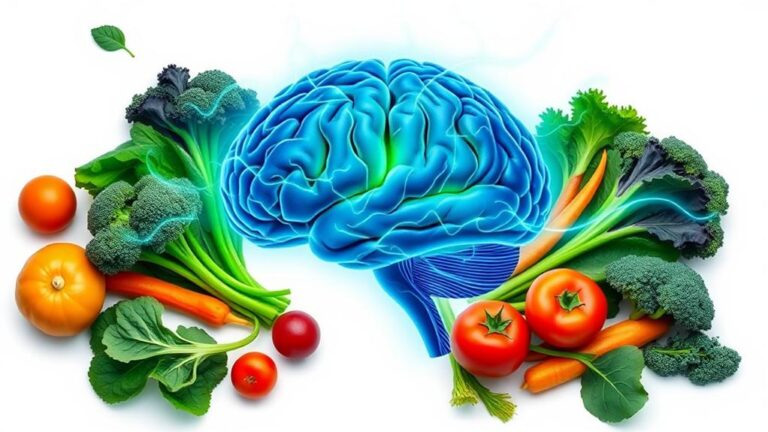Did you know that shifting your diet from high carbs to low carbs can transform your energy levels? By making this change, you're not just cutting calories; you're potentially revealing a more stable source of energy that keeps you alert and focused throughout the day. This approach can also influence how your body burns fat and manages blood sugar levels, but the real question is, what specific benefits can you expect to experience as you embrace this dietary shift?
Understanding Low Carb Diets
When you think about low carb diets, you might picture a meal plan that restricts carbohydrates while emphasizing proteins and healthy fats. This approach can help you shed pounds and maintain a healthy weight. By reducing your carb intake, you're likely to experience lower insulin levels, which can promote fat burning. The ketogenic diet, a popular low-carb approach, typically limits daily carb intake to 25-50 grams to induce ketosis, where the body burns fat for energy instead of glucose.
Low carb diets typically consist of foods like lean meats, fish, eggs, nuts, seeds, vegetables, and healthy oils. You'll find that they encourage you to swap out bread, pasta, and sugary snacks for more nutritious options. This shift can lead to improved metabolic health and better appetite control, allowing you to feel fuller with fewer calories.
As you adopt a low carb lifestyle, it's important to focus on quality. Opt for whole, unprocessed foods whenever possible.
Additionally, understanding your body's response to carbs can guide you in choosing the right balance. Some people thrive on very low carb plans, while others find moderate carb intake more sustainable. Ultimately, finding the right approach for you is vital for long-term success and overall well-being.
How Carbs Affect Energy
Carbohydrates play an essential role in fueling your body, serving as the primary energy source for many important functions. When you consume carbs, your body breaks them down into glucose, which is then used for immediate energy or stored for later use. This process is significant for maintaining your energy levels throughout the day.
However, not all carbs are created equal. Simple carbohydrates, found in sugary snacks and drinks, can lead to quick spikes in energy followed by crashes, leaving you feeling fatigued.
On the other hand, complex carbohydrates, like whole grains and vegetables, provide a steadier release of energy, helping you stay alert and focused.
Low carb diets, such as Keto and Atkins, focus on reducing carbohydrate intake and are typically high in fats and proteins, which can promote weight loss and improved metabolic health.
When you follow a low-carb diet, your body shifts from relying on glucose to burning fat for energy, which can lead to more stable energy levels. You might notice fewer energy dips and a greater sense of overall vitality.
This shift encourages your body to adapt and utilize fat as a primary fuel source, ultimately transforming how you experience energy throughout the day.
Understanding how carbs affect your energy can help you make informed dietary choices to optimize your performance and well-being.
Benefits of Ketosis
Shifting your body's primary fuel source from glucose to fat through ketosis offers several advantages. First, you'll likely experience a significant boost in energy levels. When your body burns fat for fuel, it produces ketones, which are a more efficient energy source than glucose. This means you can power through your day without the energy crashes often associated with high-carb diets.
Ketosis benefits may also include improved blood sugar control and potential therapeutic effects for certain neurological disorders.
Additionally, ketosis can enhance mental clarity and focus. Many people report improved cognitive function when in ketosis, likely due to the brain utilizing ketones instead of glucose. This shift can help you stay sharp during work or study sessions.
Another benefit is appetite regulation. While on a low-carb diet, you tend to feel fuller for longer, which can lead to reduced cravings and easier portion control. You might find it simpler to stick to your eating plan without constantly battling hunger.
Lastly, ketosis encourages fat loss while preserving muscle mass. When your body is in this state, it prioritizes burning fat, helping you shed unwanted pounds without sacrificing lean tissue.
Embracing ketosis can transform your approach to energy and weight management, making it a compelling choice for many.
Stabilizing Blood Sugar Levels
One of the key benefits of a low-carb diet is its ability to stabilize blood sugar levels. When you reduce your carbohydrate intake, your body stops experiencing the rollercoaster of sugar spikes and drops that often accompany high-carb diets. Instead, you'll find that your energy levels become more consistent throughout the day.
Keto diet benefits include improved mental clarity and focus, which can be attributed to this blood sugar stabilization. This can lead to enhanced productivity and overall well-being.
By focusing on proteins and healthy fats, you're not only giving your body the nutrients it needs but also promoting a gradual release of glucose into your bloodstream. This means you won't feel those intense cravings or sudden fatigue that can come from high-carb meals.
You might notice that you're less irritable and more focused, as your blood sugar remains steady. Additionally, stabilizing your blood sugar can help reduce the risk of developing insulin resistance, a condition that can lead to type 2 diabetes.
With a low-carb diet, you're taking proactive steps to keep your blood sugar in check, which may contribute to better overall health. So, if you want to maintain balanced energy levels and avoid those pesky crashes, embracing a low-carb lifestyle could be a smart choice for you.
Long-Term Energy Enhancements
Sustained energy is a remarkable benefit of adopting a low-carb diet. When you lower your carbohydrate intake, your body shifts its primary energy source from glucose to fat. This shift helps you tap into a more stable and long-lasting fuel source, keeping your energy levels consistent throughout the day.
You'll likely notice that you no longer experience the energy crashes often associated with high-carb meals. Instead of a quick spike followed by a slump, you'll enjoy a steady flow of energy. This can enhance your productivity and focus, whether you're at work or tackling personal projects.
Furthermore, a low-carb diet can improve your overall metabolic efficiency. As your body becomes adept at burning fat for fuel, you'll find yourself feeling more energetic during workouts and daily activities. You'll recover faster, allowing you to maintain a consistent exercise routine, which further boosts your energy levels.
In the long run, the energy enhancements you experience from a low-carb diet can lead to improved mood and motivation. This creates a positive feedback loop, where increased energy supports a more active lifestyle, making it easier to achieve your health and fitness goals.
Conclusion
Incorporating a low carb diet can truly transform your energy levels and overall well-being. By shifting your body's fuel source and stabilizing blood sugar, you'll experience lasting focus and motivation. For instance, consider Jane, who switched to a low carb lifestyle and noticed she could power through her workouts without the usual energy crashes. Embrace this dietary change, and you'll likely find yourself energized and ready to tackle whatever life throws your way.



